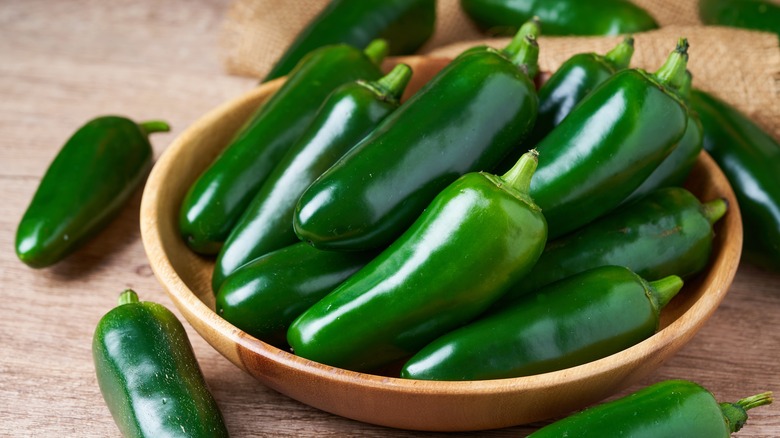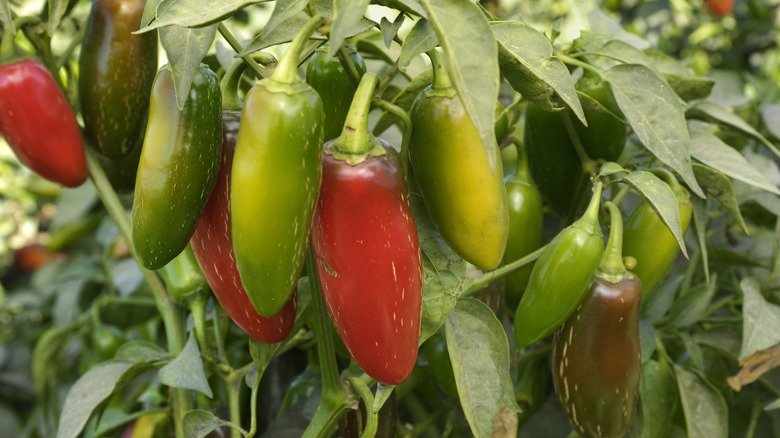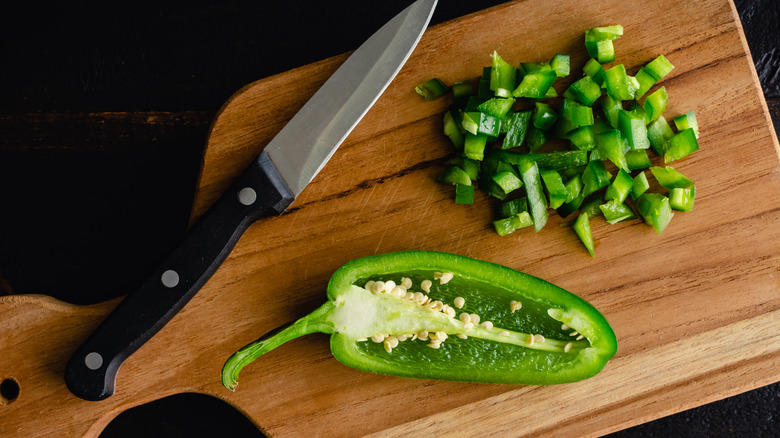Are Jalapeños Actually Getting Less Spicy?
If you've noticed that the jalapeños you're picking up at the grocery store don't seem to have the same kind of kick they used to, you're not alone. Back in 2023, D Magazine did a deep dive into whether or not there was anything to the oft-repeated complaints about mild jalapeños, and they spoke to Stephanie Walker of New Mexico State University's Chile Pepper Institute. She confirmed that they, too, had gotten a ton of complaints, and there are a few things going on here — starting with the standardization of jalapeño pepper production.
According to that article, jalapeño growers widely standardized their crops to grow a particular breed called TAM II. They're popular for a few reasons: They reliably grow to twice the size of other types of jalapeños, and they're more mild. Why is that important? The majority of jalapeños are processed into things like salsa and hot sauce, and when they're on the mild side, that allows companies to add their own levels of capsicum to standardize recipes and reliably create mild, medium, hot, and extra-hot versions of their products.
That... seems pretty logical, right? Others have picked up on the story and have tried to figure out if there's more going on here than just a corporate conspiracy to make it easier for them to produce jalapeño-based products, and it turns out that yes, there is a little more to it.
Yes, jalapenos are getting less spicy... kind of
In 2024, KRHD/ABC in Bryan, Texas reached out to Texas A&M, the university that's been blamed for creating the aptly named TAM I (TAM II's predecessor) and essentially ruining jalapeños for anyone who likes things spicy. Texas A&M professor Kevin Crosby explained that it's not precisely true: Any of the jalapeños you buy at the grocery store or farmers' markets are hybrids, so technically, the university isn't to blame for the lack of heat in today's jalapeños.
There are a few other things going on, and part of it is down to the economy. Since farmers are paid for their crops by weight, they're growing and harvesting bigger peppers. They'll earn more per pepper, but bigger peppers tend to be less spicy. Also, the heat contained in any given jalapeño depends on growing conditions: A hot, dry growing season will subject the plant to stress that will make it spicier, so there are a ton of variations among peppers of even the same variety.
Finally, food historian David DeWitt told National Geographic: "There's definitely a bigger tolerance for spice than I've ever seen in my 70 years on the planet. People travel more, they see more on TV, and have more opportunities to experience other culture's cuisine." In other words? The variety of hot and spicy foods — from entire dishes to hot sauces — means that our tastes have evolved to be more accepting of the kind of heat that a jalapeño brings to the table.
Craving the heat you're missing? Here's what you can do
Love your jalapeño bacon mac and cheese and your Crock-pot jalapeño spinach dip? Find yourself wishing that your jalapeño popper sandwiches had a little more, well, pop? Have no fear: There are a few things you can do to bring the spice back to your dinners, and let's start with a tip that comes via Chef Amanda Frietag.
Frietag says that smooth, blemish-free skin is a sign that it's going to be more on the mild side, but if the pepper has those lines that look like someone's taken a needle and thread to it, you know it's going to be a spicier one. While comments on the chef's video suggest that not everyone found this to be a foolproof method of predicting spiciness, others confirmed that it worked.
What else can you do? Jalapeños are fairly easy to grow at home, so you could always opt for buying seeds, finding a sunny spot, and planting your own pepper plants in pots because yes, some varieties are going to be hotter than others. You could also move on to another pepper entirely: Serrano, Fresno, and Habaneros are all great options. Also, here's another time when heading to the farmer's market is invaluable. Small-scale farmers will be able to tell you more about the heat that can be expected from their peppers, and yes, you can definitely stock up at the market and freeze those fresh peppers.


